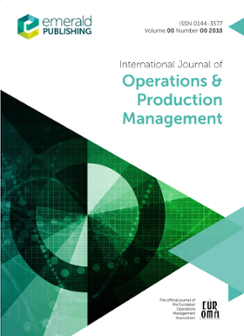为新冠肺炎之后的下一次中断做好供应链准备:供应链弹性的管理前提
IF 7.1
2区 管理学
Q1 MANAGEMENT
International Journal of Operations & Production Management
Pub Date : 2021-12-10
DOI:10.1108/ijopm-04-2021-0272
引用次数: 34
摘要
2019冠状病毒病目标再次表明了在供应链中建立韧性的重要性。现有的供应链弹性管理研究已经成功地确定了一组有助于供应链弹性的组织前因。然而,人们对企业内部这些前因的形成机制知之甚少。利用动态管理能力理论,本研究旨在探讨供应链管理者在组织前因发展中所起的关键作用。具体而言,本研究表明供应链管理者的社会资本、人力资本和认知对组织供应链弹性前因可视性、响应性和灵活性的发展有促进作用,进而增强企业的供应链弹性。设计/方法/方法作者采用从澳大利亚598家制造企业收集的调查数据,以及Hayes和Preacher(2014)的平行多重中介模型对假设进行实证检验。研究结果表明,供应链管理者的社会资本、人力资本和认知确实对供应链弹性的发展有影响。此外,本研究还确定了管理者社会资本、人力资本和认知对供应链弹性的中介作用。原创性/价值本研究对现有的供应链弹性文献做出了贡献,调查了供应链管理者在发展其公司弹性方面所起的作用。本文章由计算机程序翻译,如有差异,请以英文原文为准。
Preparing supply chain for the next disruption beyond COVID-19: managerial antecedents of supply chain resilience
PurposeCOVID-19 once again showed the importance of building resilience in supply chains. Extant research on supply chain resilience management has successfully identified a set of organizational antecedents that contribute to supply chain resilience. However, little is known about the mechanisms by which these antecedents are developed within a firm. Drawing on the dynamic managerial capabilities theory, the current study aims to investigate the critical role that supply chain managers play in developing the organizational antecedents. Specifically, this study shows that supply chain managers' social capital, human capital and cognition are instrumental to the development of three organizational supply chain resilience antecedents: visibility, responsiveness and flexibility, which subsequently enhance the firm's supply chain resilience.Design/methodology/approachThe authors employ survey data collected from 598 manufacturing firms in Australia, and Hayes and Preacher's (2014) parallel multiple mediator model to empirically test the hypotheses.FindingsThe findings of the study establish that supply chain managers' social capital, human capital and cognition indeed have implications for developing supply chain resilience. Furthermore, the mediators through which managers' social capital, human capital and cognition improve supply chain resilience are identified in the current study.Originality/valueThe study contributes to the extant literature on supply chain resilience, investigating the role that supply chain managers play in developing the resilience of their firm.
求助全文
通过发布文献求助,成功后即可免费获取论文全文。
去求助
来源期刊
CiteScore
13.30
自引率
17.20%
发文量
96
期刊介绍:
The mission of the International Journal of Operations & Production Management (IJOPM) is to publish cutting-edge, innovative research with the potential to significantly advance the field of Operations and Supply Chain Management, both in theory and practice. Drawing on experiences from manufacturing and service sectors, in both private and public contexts, the journal has earned widespread respect in this complex and increasingly vital area of business management.
Methodologically, IJOPM encompasses a broad spectrum of empirically-based inquiry using suitable research frameworks, as long as they offer generic insights of substantial value to operations and supply chain management. While the journal does not categorically exclude specific empirical methodologies, it does not accept purely mathematical modeling pieces. Regardless of the chosen mode of inquiry or methods employed, the key criteria are appropriateness of methodology, clarity in the study's execution, and rigor in the application of methods. It's important to note that any contribution should explicitly contribute to theory. The journal actively encourages the use of mixed methods where appropriate and valuable for generating research insights.

 求助内容:
求助内容: 应助结果提醒方式:
应助结果提醒方式:


